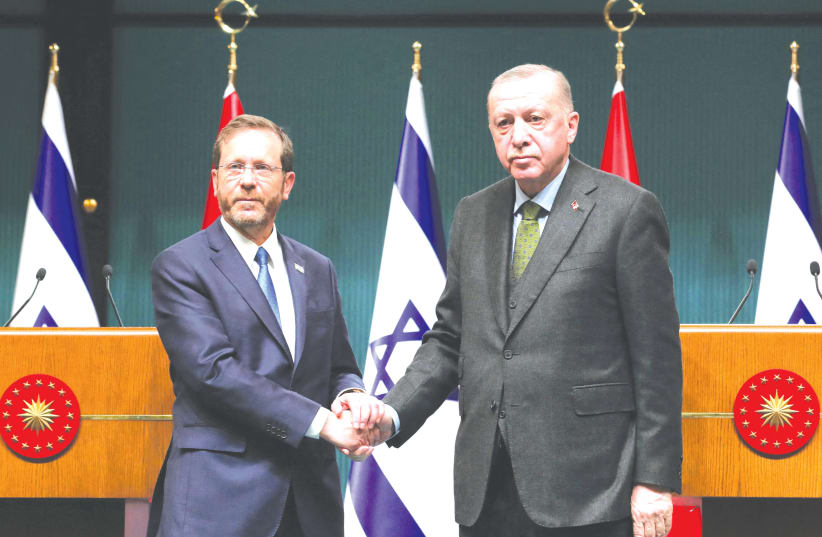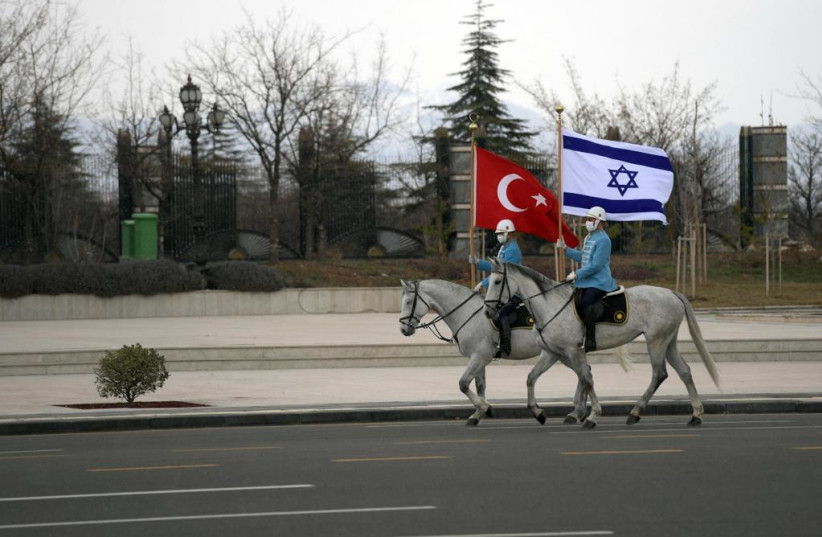Last week, The Jerusalem Post had the opportunity to visit Turkey for three days, including on- and off-record briefings with Turkey’s foreign minister, deputy energy minister, multiple top foreign investment and business officials and a range of others.
After all of those meetings, the current state of the Israel-Turkey renaissance in relations can be summarized as the early stages of flirting to decide whether or not to make a commitment.
While it may seem strange to describe relations between countries in dating terms, those terms very much encapsulate the bizarre and paradoxical messages that the two sides are sending to each other at this time.
Both countries, for the moment, think it might be in their interest (though each country’s interests are distinct) to have a significant warming in relations and increase in business.
But both are suspicious of the other side’s seriousness, and all of the big questions are still open. How will the countries balance Turkey’s ongoing hosting of Hamas officials? How will Turkish President Recep Tayyip Erdogan react to the next major conflict between Israel and Hamas or other Palestinians? Will Turkey put out the $1.5 billion in investment that would be needed for the parties to build a joint natural gas pipeline to Europe? How will differences over Iran and over negotiations with the Palestinian Authority impact any future progress? Will Israelis really reinvest in Turkey and increase visits when the Turks still seem unwilling to reciprocate in any kind of a balanced way?
The most confusing messages are probably regarding Hamas.
Everyone who follows terrorism knows that Hamas and top official Saleh al-Arouri have directed much of its West Bank terrorism against Israel in recent years from Turkey, since he was expelled from Qatar in 2017 after being declared a terrorist by the US in 2015. Many of Hamas’s “legal” investments, which are then laundered into financing terrorism, came through Turkey, at least until recently, according to intelligence sources.
Frequently, it seems that Erdogan favors the more religious Hamas over the West-supported and more secular PA. Turkish officials seem to want to play down the past (and act as if they do not need to know who Arouri is) and focus on the future. They insisted that any Hamas activities in Turkey had been only political and not planning military (terrorist) operations.
When leaned on about the future, it seemed that they might very quietly press Hamas to actually toe that line.
As a leading Muslim Brotherhood and religious country, Erdogan’s Turkey certainly does not want headlines about him cracking down on Hamas.
The huge Turkish Anadolu state-run media agency gave an impressive presentation to the Post and other Israeli journalists regarding its global breadth and its readiness to criticize abuses of power. But, under questioning, it seemed to emerge that most criticism was against any mistreatment of Muslims, less about violations by Muslim groups.
There were already the first signs of a break between Turkey and Hamas when Erdogan’s government condemned the terrorist attack in Tel Aviv, leading to Hamas condemning Turkey.
Did that exchange lead Turkey to be more worried about crossing Hamas, or did it lead Erdogan to be more willing to put Hamas in its place and remind it that he is hosting it conditionally?
Only time will tell – and pipelines.
IF THERE is any single issue that might be the most crucial in determining the direction of the Israeli-Turkish relationship, it may be whether the two countries commit to this massive three- to five-year gas pipeline building project. If they do, it could create interdependence to reap enormous future profits potentially for a decade or much longer.
Yet, after many conversations with Turkish officials, there was no clear message on whether Ankara will commit the funding necessary to make the pipeline worthwhile to Jerusalem.
Israel has multiple other options to ship its Leviathan field natural gas as liquefied natural gas, as it has been doing in recent years.
One possibility is that Turkey is only proposing the pipeline to try to expose the financial absurdity of the Israel-Greece-Cyprus-Italy (and maybe others) pipeline idea, for which agreements have already been signed.
However, most experts and officials say that the so-called East Mediterranean pipeline idea, which at $6 billion would require four times the investment that the much shorter and relatively easier Turkish pipeline would take to build, is a pipe dream.
Even if discussions with Turkey fail, simply having serious practical discussions about the financial feasibility of a much cheaper pipeline could ruin even the small chance of the East Mediterranean idea.
If Turkish officials are taken at their word, they definitely want the pipeline, but they want some other additional mix of investors. They may want to include some of the East Mediterranean group and maybe countries in Europe and elsewhere, to shoulder the funding of the pipeline’s construction along with them.
Also, even if both Turkey and Israel want better relations, after more than a decade of mostly diplomatic conflict, each country may just want to take things slow to make sure the positivity is not a passing fad.
Some officials said plainly that the pipeline could have been agreed to in 2017 and could have started running already this past year, as a show of how serious Ankara is if Israel will cross the aisle toward it on the issue.
So some of the final outcome may just be a question of timing.
Will both Israel and Turkey decide to commit at the same time, or will one side hold out on committing long enough to lead the other side to lose interest?
ISRAEL WANTS a less hostile Turkey, not only to make the country less hospitable to Hamas, but because Turkey is another power in the Middle East. Restored normalization with Ankara would boost the Abraham Accords narrative and further harm Iranian efforts to rally against the Jewish state.
Curiously, it seemed that Turkish officials were quite free and ready to criticize Iranian aggression in certain parts of the Middle East.
Strangely, some seemed to blame the deadlock on Iran nuclear negotiations on Russia. This despite that it seems pretty apparent that Moscow only delayed a deal for some weeks, and Tehran is holding out now for concessions related to the US delisting the Islamic Revolutionary Guard Corps from its terrorist list.
Are Turkish comments about the Islamic Republic genuine or a ploy for Israeli and Western help in other areas?
Erdogan is trying to get Turkey out of an economic crisis.
In order to do this, Turkey wants to rebuild ties with the US and the West, after Erdogan’s crackdown on internal opposition and trying to overplay Ankara’s diplomatic strengths in recent years frayed relations.
Jerusalem is still seen by many Middle Eastern countries as a helper in this area.
Also, the more the Abraham Accords stick, the more Erdogan has seen his country is missing out on economic opportunities with the Start-Up Nation.
Another ingredient is that Erdogan had personal baggage with former prime minister Benjamin Netanyahu, and his government views current Prime Minister Naftali Bennett as someone who is easier to do business with.
A further possibility is that everyone knows that the pipeline is pie in the sky, but that talking about it could help warm trade ties.
Israeli-Turkish relations went down hard from at least 2009 to 2016, improved briefly from 2016 to 2018 and then plummeted again until summer 2021 and President Isaac Herzog’s visit to Ankara in March.
Yet, even during the down periods, there were several billion dollars in trade, and Israeli tourism to Turkey fell but never disappeared.
Just giving a shot in the arm to trade and tourism could benefit both countries economically and diplomatically, and talking about big national projects like a pipeline sends certain normalized messages to the general public.
There would need to be some concrete specific policy shifts. Turkish businesspeople talked about major Israeli banks having pulled out of Turkey in the past, and there would likely be a ceiling on certain investment and trade activities unless these banks return and restore certain preferential economic policies for the Turks.
But will Israel be willing to take these measures, when the average Turk does not show a readiness to invest in or visit Israel?
Israel’s latest internal political instability will certainly not help progress. Top Turkish officials are expected to visit Israel at the end of May. Those meetings and the coming summer months could determine the direction of relations for years to come.

